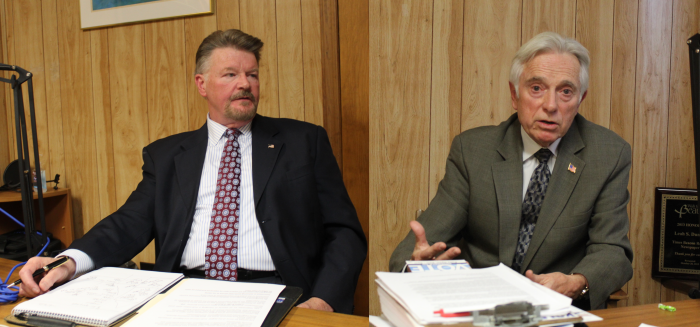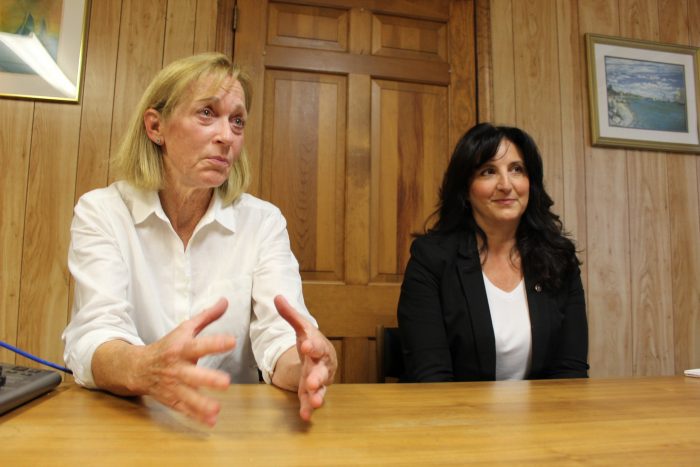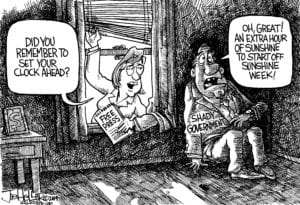Former Smithtown Town Clerk Vincent Puleo (R) got a promotion last November when county voters elected him as Suffolk County clerk after 16 years in the Smithtown Town Clerk’s Office.
The vacancy Puleo left behind in January has remained unfilled ever since. Now, for the first time in nearly two decades, town residents will choose his successor.
Stepping forward for the role are Bill Holst (D) and Tom McCarthy (R). McCarthy is not the same person as incumbent town Councilman Thomas J. McCarthy (R).
Holst has served in various public service roles throughout his professional career. He was an assistant town attorney in Smithtown and Central Islip. He was appointed as Suffolk County clerk by former Gov. Mario Cuomo (D) until losing that post in an election against then-county Legislator Ed Romaine (R).
“By and large, I enjoy public service,” Holst said. “I think there’s an opportunity, since the town clerk’s position has been vacant since January, to improve the dialogue” within town government.
McCarthy hails from the security sector, where he worked in various management roles and specialized in investigations, executive protection and security aberrations.
“It’s not about politics. It’s about service,” he said. “I was responsible for all aspects of managing a multimillion-dollar profit center in addition to overseeing all the security operations. I have skill sets in administration, finance, operations, client services and HR,” adding that he intends to leverage this private-sector background for Smithtown residents.
Role of the clerk
In outlining what he views as the principal responsibilities of the town clerk, McCarthy referred to the position as “a forward-facing client service office” that also serves as secretary to the Town Board.
“We provide licenses that protect people, property and the environment,” he said. “The town clerk provides permits for people to make a living lawfully. We touch people’s lives at very tender moments — birth, marriage.”
He emphasized that the town clerk is not a policymaker but a service provider. “What it’s about is transparency, security of the records and providing those services to our people,” McCarthy said.
Holst referred to the clerk’s office as “the gateway to the town.” He emphasized that the position has been vacant since January, with the deputy clerks having kept the office running since that time.
“I think that if the people in the existing office can run the office without anyone being appointed, then the person who is running should be able to justify what they’re bringing,” he said. “I’m bringing years of experience as an assistant town attorney, a county attorney and the chief legal officer of the City of Long Beach, where I was involved with things like land use.”
While the clerk may fall outside the political functions overseen by the Town Board, Holst said the clerk’s role is to “make them reach higher on behalf of the taxpayers.”
Cybersecurity
In light of last year’s cyberattack against the Suffolk County government, a ransomware event crippling the county government’s IT infrastructure for months and compromising residents’ sensitive information, both candidates were asked how they would fortify the town’s network, keeping sensitive records safe.
Holst said overseeing the system’s passwords would be a necessary deterrent while coordinating closely with town IT personnel. “I think that in terms of the security matters, it all has to be done with the town’s IT department,” he said.
McCarthy cited deterrence, detection and response as the “three pillars of cybersecurity.” He noted that the human element is generally the weakest link within any cybersecurity program.
“The biggest part is training and enabling your people, creating an environment where they can be excellent,” he said.
Resident access
As a service provider within town government, the clerk frequently interacts with constituents. McCarthy touted the accessibility of the office as it stands today.
“We want the experience to be welcoming,” the Republican candidate said. “We want 100 percent customer satisfaction. You can do that by providing an environment where your team can reach excellence, and they can produce and provide a service to the public.”
Holst contended that the real value of the clerk’s position comes from maximizing its service functions as outlined under the code. “Even with Freedom of Information Act [requests] … the Town Code talks about how documents can be made through the Town Clerk’s Office,” he indicated.
Staffing
Currently, there are two appointed deputy clerk positions within the office, with the others being civil service positions. When asked for the principles that would guide personnel matters, Holst said his past experience working alongside civil service officials would be an asset.
“I had a lot of dealings with labor issues, and I definitely respect anyone who’s in the civil service,” he said.
McCarthy said his private-sector background has guided his approach to personnel hires. He emphasized finding staff who are enthusiastic about providing a service and adding value to others.
“One of the things you want is someone who enjoys people, has the personality and the intelligence to learn and a dedication to do customer service,” he said. “Those are the skills you look for.”
Open government
When asked how they would promote open government within the office and bring residents closer to town government, McCarthy emphasized the value of transparency. “From the outside looking in, I see a functional office,” he said. “If you just get on the website, you can get just about any information you want.” He also promoted maintaining an open-door policy.
Holst said the clerk could advocate for promoting the Public Officers and Open Meetings laws. “I don’t think the Open Meetings law is being followed,” he said. “Although I can’t force [the Town Board] to do something, I can certainly raise the issue.”
Smithtown voters will choose one of these two candidates on Tuesday, Nov. 7.









